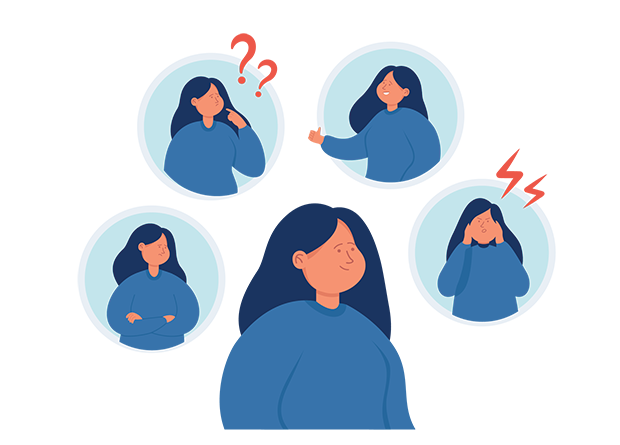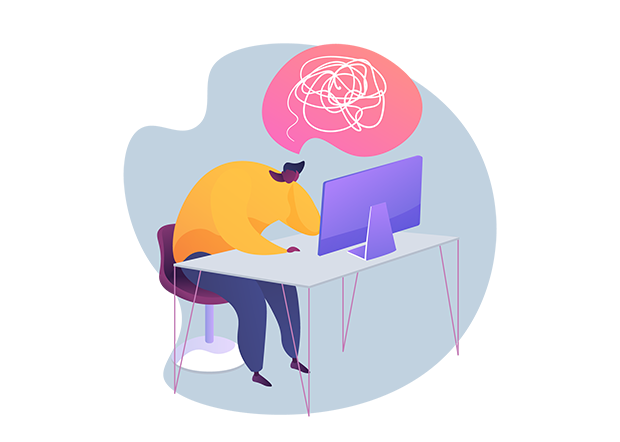OCD Treatment
in Atlanta
Starting treatment for OCD (obsessive-compulsive disorder) is a brave first step. At Atlanta Integrative Psychiatry, we offer personalized OCD treatment in Atlanta based on the individual's needs and objectives. Our treatment processes can help you live a more fulfilling life.


What Is OCD?
Obsessive-compulsive disorder (OCD) is a mental health disorder characterized by intrusive thoughts that cause anxiety and repetitive behaviors or rituals performed to reduce the associated stress. OCD affects people of all ages and can interfere with daily functioning. Common symptoms include fear of contamination, obsession with orderliness, excessive double-checking behavior, and unwanted sexual or aggressive thoughts.
Recommended: Can Trauma Cause OCD?
Signs and Symptoms of OCD
- Intrusive, repetitive thoughts or images (Obsessions).
- Repetitive behaviors or mental acts a person feels driven to perform in response to an obsession (Compulsions).
- Anxiety and excessive worry about the consequences of certain decisions.
- Perfectionism-related obsessions include doubts over trivial decisions, fear of making mistakes, and hyperfocus on details.
- Fear of contamination and germs leads to frequent hand washing, cleaning rituals, and so on.
- Unwanted aggressive or sexual thoughts that lead to avoidance behaviors.
What Are Obsessions?
Obsessions are intrusive, repetitive thoughts or images that cause distress and anxiety. People with OCD often feel like they have no control over these obsessive thoughts and may become preoccupied with them for hours each day.
What Are Compulsions?
Compulsions are repetitive behaviors or mental acts that a person feels driven to perform in response to an obsession. These compulsions may be used to try to relieve the distress caused by obsessions, but they can also become their own source of anxiety and stress.
How Is OCD Treated in Atlanta?
OCD is usually treated with a combination of cognitive-behavioral therapy (CBT), medication, and exposure response prevention (ERP) techniques.
CBT helps to identify the thoughts, feelings, and behavior patterns associated with OCD and can be used to help change them. Medications such as selective serotonin reuptake inhibitors (SSRIs) are often prescribed to reduce anxiety levels related to OCD symptoms. ERP involves gradually exposing individuals to their fears in a safe environment until they become desensitized.
What to Expect During Outpatient OCD Treatment in Atlanta, GA
Starting outpatient OCD treatment in Atlanta consists of several processes to help identify the most appropriate treatment methods for the individual, as follows:
Initial Assessment and Psychiatric Evaluation
An initial assessment and psychiatric evaluation for OCD is conducted by a psychiatrist to assess an individual’s mental health status, medical history, and current OCD symptoms to determine whether medication would be beneficial for symptom management. The doctor may also discuss other treatment options as they develop a personalized treatment plan.
Medication-Assisted Treatment
Medication-assisted treatment (MAT) uses medications in combination with psychotherapy to treat OCD. Commonly prescribed medications include selective serotonin reuptake inhibitors (SSRIs), antipsychotics, and benzodiazepines, which can help reduce anxiety levels related to OCD symptoms.
Nutritional Services
Nutritional services can be beneficial for individuals with OCD. Nutritionists can recommend dietary changes, suggest supplements, and provide lifestyle advice to help reduce symptoms of anxiety or depression related to OCD. Additionally, nutrition education can teach individuals the importance of healthy eating habits to maintain mental well-being.
Psychotherapy
Psychotherapy is the use of psychological techniques to help treat OCD. Cognitive-behavioral therapy (CBT) is a popular form of psychotherapy and can be highly effective in helping individuals understand and manage their symptoms. Other forms of psychotherapy that may be beneficial include interpersonal therapy, dialectical behavior therapy (DBT), acceptance and commitment therapy (ACT), and eye movement desensitization reprocessing (EMDR).
Genetic Testing
Genetic testing can be a helpful tool in diagnosing and treating OCD. By looking at an individual’s genetic code, doctors can identify any mutations or variations that might contribute to developing OCD symptoms. This information can help guide treatment decisions, including which medications may be most effective for symptom management.
TMS Therapy
Transcranial magnetic stimulation (TMS) is a non-invasive, FDA-approved procedure that uses pulsed electromagnetic fields to stimulate brain areas associated with OCD. During treatment sessions, patients will sit in a comfortable chair and wear an adjustable headset that delivers mild electrical pulses to specific parts of the brain. This therapy is typically used in combination with psychotherapy and medication management for optimal results.
Spravato/Ketamine Therapy
Spravato (esketamine) is a nasal spray medication approved by the FDA for treatment-resistant OCD. It works by blocking specific receptors in the brain, which helps to reduce symptoms of depression and anxiety. Ketamine therapy is another type of drug used to treat OCD. It works similarly to Spravato but through intravenous infusions rather than intranasal administration.

Risk Factors for OCD
Common risk factors of OCD can include the following:
- Genetics - Individuals who have family members with OCD are more likely to develop the disorder.
- Stressful life events - Traumatic experiences or stressful situations can trigger symptoms of OCD.
- Age - Children and teenagers may be more prone to developing OCD than adults.
- Brain chemistry – Abnormalities in certain brain chemicals, such as serotonin, may increase an individual’s risk of developing OCD.
- Alcohol and substance use disorders - Individuals with an alcohol or substance use disorder and a predisposition for OCD can be at a greater risk of developing this mental health disorder.
OCD Statistics
According to the Anxiety and Depression Association of America:
- OCD affects approximately 2.2 million adults in the United States.
- Women are three times more likely to be affected by OCD than men.
- The average age of OCD onset is 19.
- 25 percent of OCD cases occur by age 14.
- One-third of adults with OCD first experienced symptoms in childhood.
Find OCD Treatment in Atlanta, GA Today
Atlanta Integrative Psychiatry specializes in providing comprehensive OCD treatment for individuals and families. Our experienced team of psychiatrists and mental health professionals provides evidence-based care to develop personalized treatment plans to address each client's unique needs.
We understand that seeking help can be difficult, so we strive to make our clients feel safe and empowered throughout their experience with us. If you or a loved one is struggling with OCD symptoms, schedule an appointment today to learn more about how we can help.
Sources:
Anxiety Disorders – Facts & Statistics. (2022).
Cocchi L, Zalesky A, Nott Z, Whybird G, Fitzgerald PB, Breakspear M. (2018). Transcranial Magnetic Stimulation in Obsessive-Compulsive Disorder: A Focus on Network Mechanisms and State Dependence.
You are not alone. You deserve to get help.
Atlanta Integrative Psychiatry is an Industry leader in mental health treatment . Our team of top medical experts specialize in dual diagnosis treat and are committed to ensuring that each patient is treated as an individual.
Call us today, we're avialable 24/7.




